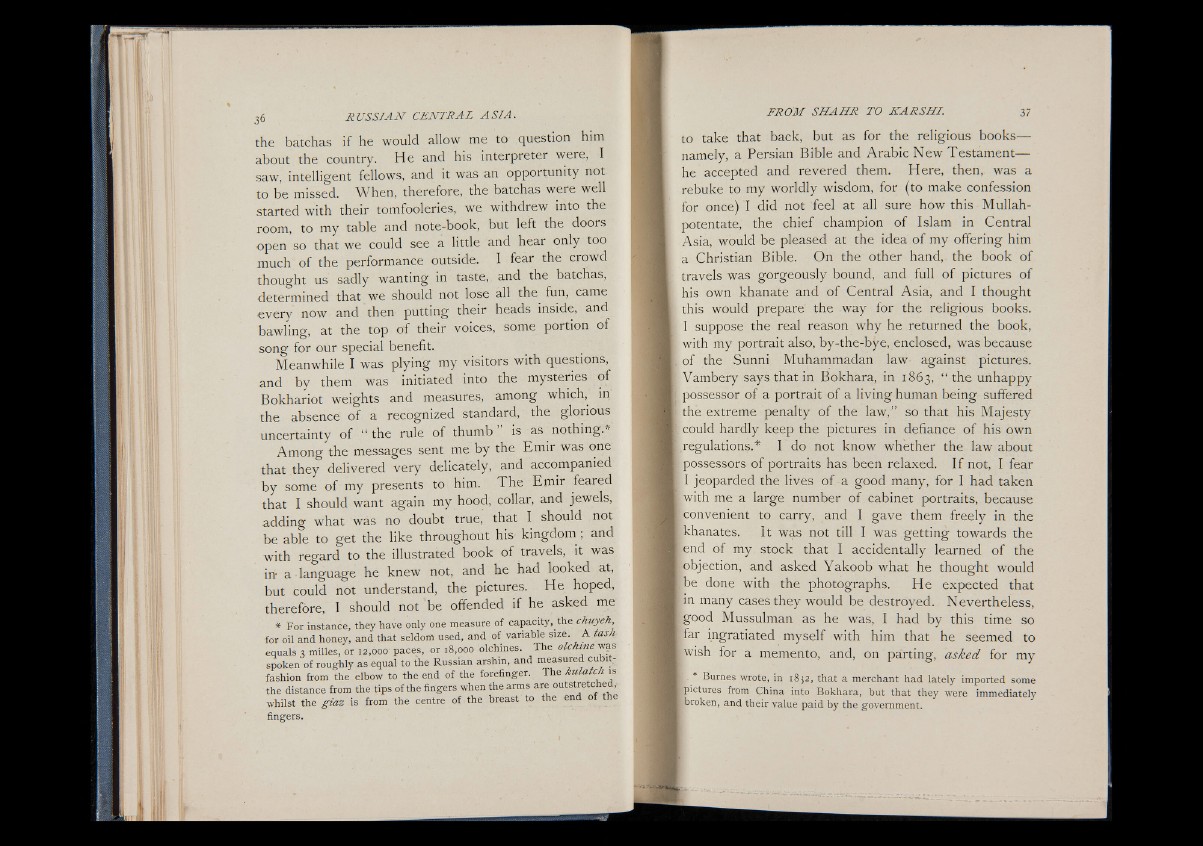
the batchas if he would allow me to question him
about the country. He and his interpreter were, I
saw, intelligent fellows, and it was an opportunity not
to be missed. When, therefore, the batchas were well
started with their tomfooleries, we withdrew into the
room, to my table and note-book, but left the doors
open so that we could see a little and hear only too
much of the performance outside. I fear the crowd
thought us sadly wanting in taste, and the batchas,
determined that we should not lose all the fun, came
every now and then putting their heads inside, and
bawling, at the top of their voices, some portion of
song for our special benefit.
Meanwhile I was plying my visitors with questions,
and by them was initiated into the mysteries of
Bokhariot weights and measures, among which,, in
the absence of a recognized standard, the glorious
uncertainty of “ the rule of thumb’ is as nothing.*-
Among the messages sent me by the Emir was one
that they delivered very delicately, and accompanied
b y some of my presents to him. The Emir feared
that I should want again my hood, collar, and jewels,
adding what was no doubt true, that I should not
be able to get the like throughout his kingdom; and
with regard to the illustrated book of travels, it was
in- a language he knew not, and he had looked at,
but could not understand, the pictures. He hoped,
therefore, I should not 'be offended if he asked me
* For instance, they have only one measure of capacity, the chuyeh,
for oil and honey, and that seldom used, and of variable size. A tas/i
equals 3 milles, or 12,000 paces, or 18,000 olchines. The olchine wqs
spoken of roughly as equal to the Russian arshin, and measured cubit.-
fashion from the elbow to the end of the forefinger. The kulatch is
the distance from the tips of the fingers when the arms are outstretched,
whilst the giaz is from the centre of the breast to the end of t e
fingers.
to take that back, but as for the religious books—
namely, a Persian Bible and Arabic New Testament—
he accepted and revered them. Here, then, was a
rebuke to my worldly wisdom, for (to make confession
for once) I did not feel at all sure how this Mullah -
potentate, the chief champion of Islam in Central
Asia, would be pleased at the idea of my offering him
a Christian Bible. On the other hand, the book of
travels was gorgeously bound, and full of pictures of
his own khanate and of Central Asia, and I thought
this would prepare" the way for the religious books.
I suppose the real reason why he returned the book,
with my portrait also, by-the-bye, enclosed, was because
: of the Sunni Muhammadan law- against pictures.
Vambery says that in Bokhara, in 1863, “ the unhappy
possessor of a portrait of a living human being suffered
the extreme penalty of the law,” so that his Majesty
could hardly keep the pictures in defiance of his own
regulations.* I do not know whether the law about
[possessors of portraits has been relaxed. I f not, I fear
[ I jeoparded the lives of a good many, for I had taken
¡with me a large number of cabinet portraits, because
I convenient to carry, and I gave them freely in the
I khanates. It was not till I was getting towards the
lend of my stock that I accidentally learned of the
¡objection, and asked Yakoob what he thought would
Ibe done with the photographs. He expected that
¡in many cases they would be destroyed. Nevertheless,
¡good Mussulman as he was, I had by this time so
¡far ingratiated myself with him that he seemed to
■wish for a memento, and, on parting, asked for my
I. * Burnes wrote, in 1852, that a merchant had lately imported some
I pictures from China into Bokhara, but that they were immediately
»broken, and their value paid by the government.